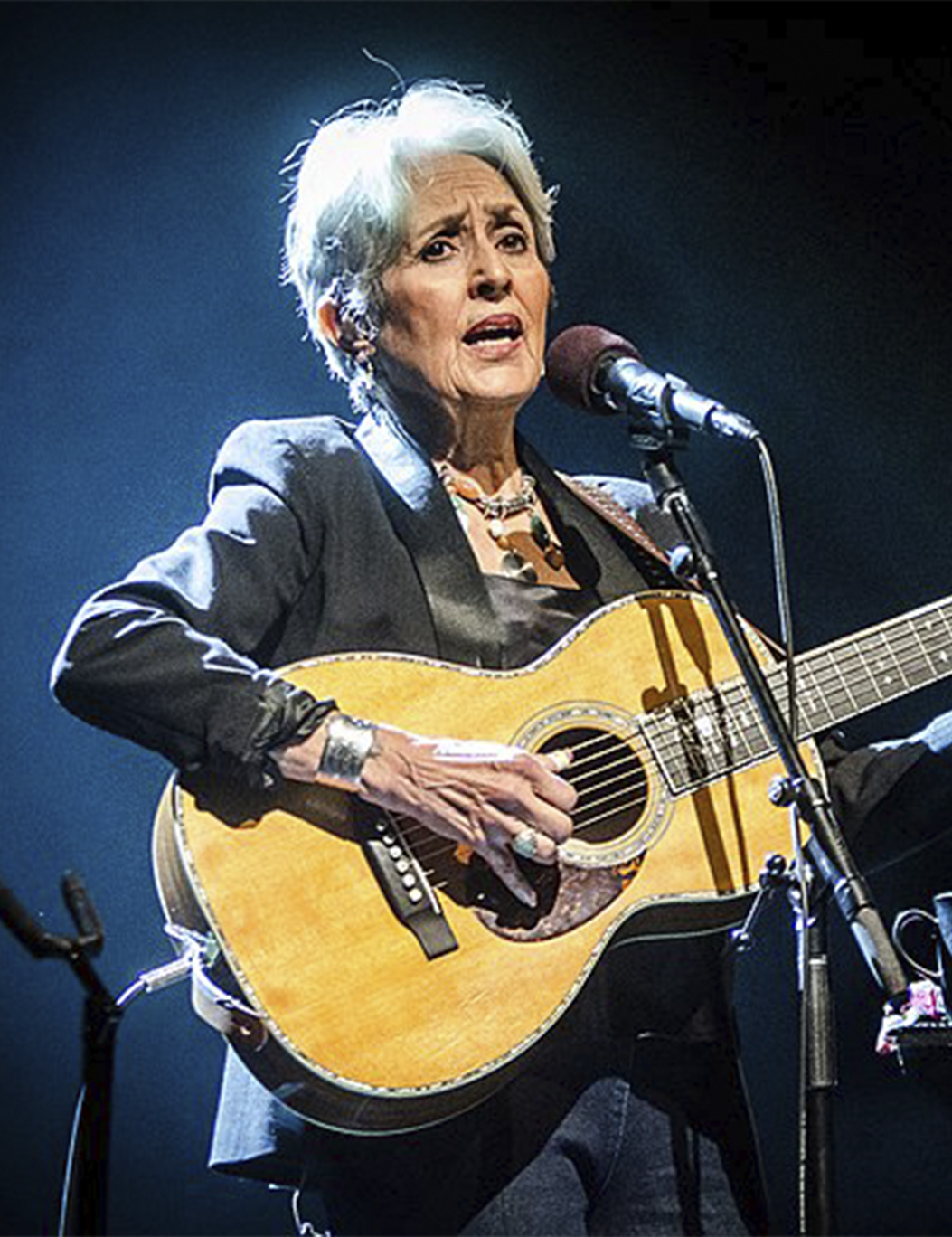- 14 3402-5578
- Rua Hygino Muzy Filho, 737, MARÍLIA - SP
- contato@latinoobservatory.org
 Joan Baez at the The Egg (Albany, NY), March 2016.jpg - Photo by Jim Gilbert /commons.wikimedia.org
Joan Baez at the The Egg (Albany, NY), March 2016.jpg - Photo by Jim Gilbert /commons.wikimedia.org
Joan Baez (born January 9, 1941) is an American folk singer, songwriter and activist who is best known for songs like “There But for Fortune”, “The Night They Drove Old Dixie Down” and “Diamonds and Rust”. She is an American singer, songwriter, musician, and activist. Her contemporary folk music often includes songs of protest and social justice. Baez has performed publicly for over 60 years, releasing more than 30 albums. Fluent in Spanish and English, she has also recorded songs in at least six other languages.
Baez is generally regarded as a folk singer, but her music has diversified since the counterculture era of the 1960s and encompasses genres such as folk rock, pop, country, and gospel music. She began her recording career in 1960 and achieved immediate success. Her first three albums, Joan Baez, Joan Baez, Vol. 2 and Joan Baez in Concert, all achieved gold record status. Although a songwriter herself, Baez generally interprets other composers' work, having recorded songs by the Allman Brothers Band, the Beatles, Jackson Browne, Leonard Cohen, Woody Guthrie, Violeta Parra, the Rolling Stones, Pete Seeger, Paul Simon, Stevie Wonder, Bob Marley, and many others. She was one of the first major artists to record the songs of Bob Dylan in the early 1960s; Baez was already an internationally celebrated artist and did much to popularize his early songwriting efforts. On her later albums she has found success interpreting the work of more recent songwriters, including Ryan Adams, Josh Ritter, Steve Earle, Natalie Merchant, and Joe Henry.
Baez’s acclaimed songs include “Diamonds & Rust” and covers of Phil Ochs’s “There but for Fortune” and The Band’s “The Night They Drove Old Dixie Down”. She is also known for “Farewell, Angelina”, “Love Is Just a Four-Letter Word”, “Forever Young”, “Here’s to You”, “Joe Hill”, “Sweet Sir Galahad” and “We Shall Overcome”. Baez performed fourteen songs at the 1969 Woodstock Festival and has displayed a lifelong commitment to political and social activism in the fields of nonviolence, civil rights, human rights, and the environment. Baez was inducted into the Rock and Roll Hall of Fame on April 7, 2017.
Baez was born on Staten Island, New York, on January 9, 1941. Her grandfather, the Reverend Alberto Baez, left the Catholic Church to become a Methodist minister and moved to the U.S. when her father was two years old. Her father, Albert Baez (1912–2007), was born in Puebla, Mexico, and grew up in Brooklyn, New York, where his father preached to—and advocated for—a Spanish-speaking congregation. Albert first considered becoming a minister but instead turned to the study of mathematics and physics and received his PhD degree at Stanford University in 1950. Albert was later credited as a co-inventor of the x-ray microscope. Joan's cousin, John C. Baez, is a mathematical physicist.
Her mother, Joan Chandos Baez (née Bridge), referred to as Joan Senior or “Big Joan”, was born in Edinburgh, Scotland, the second daughter of an English Anglican priest who claimed to be descended from the Dukes of Chandos. Born in April 1913, she died on April 20, 2013.
The Baez family converted to Quakerism during Joan’s early childhood, and she has continued to identify with the tradition, particularly in her commitment to pacifism and social issues. While growing up, Baez was subjected to racial slurs and discrimination because of her Mexican heritage. Consequently, she became involved with a variety of social causes early in her career. She declined to play in any white student venues that were segregated, which meant that when she toured the Southern states, she would play only at black colleges.
Owing to her father's work with UNESCO, their family moved many times, living in towns across the U.S. as well as in England, France, Switzerland, Spain, Canada, and the Middle East, including Iraq. Joan Baez became involved with a variety of social causes early in her career, including civil rights and nonviolence. Social justice, she stated in the PBS series American Masters, is the true core of her life, "looming larger than music”. Baez spent much of her formative youth living in the San Francisco Bay area, where she graduated from Palo Alto High School in 1958.
Joan Baez’s professional career began in 1959 at the Newport Folk Festival, where, at the age of 18, she was a huge revelation. She released by Vanguard Records, “Joan Baez by Vanguard Records”, then “Joan Baez a collection of traditional ballads, which sold a string of hits, release hits", for her guitar talent on the acoustic guitar, ally to her beautiful soprano-launching voice. The next album, “Joan Baez Vol. 2”, was released in 1961. It won a gold artistic record, with "Joan Baez in Concert", from 1962. By 1963, she was already considered one of the most popular singers in the United States. In 1964, she launched the disco Joan Baez/5, incorporating the work in this selection of folk songs from the States and Latin America, with emphasis on Brazilians for the interpretation of compositions by musicians from Latin America, Villa-Lobos and Zé do Norte. In addition to traditional and protest folk, including Bob Dylan compositions, traditional print and several from her repertoire. Among her historical hits from this time, between her boyfriends for a while but the relationship ended in 1965, can be mentioned “We should over”, “With God on our side”, “All my trials”, among others.
Joan Baez sings two songs that are part of the soundtrack of the film Silent Running, by director Douglas Trumbull (the same person responsible for the special effects of “2001: A Space Odyssey”, by Stanley Kubrick). The film is from 1971 and is an ecological science fiction. The songs are: “Rejoice on the Sun” and “Silent Running”.
In the 1990s, despite these constant label changes, Baez continued releasing his albums. The CD "Ring them bells", from 1996, was considered the best contemporary folk work of the year by magazines specialized in the genre. Her last was 2003’s “Dark Chords on a Big Guitar”, after a few years without recording.
In 2008, Joan Baez celebrated the 50th anniversary of her musical career with tours of the United States and Europe. She also released the 2008 CD Day After Tomorrow, produced by singer-songwriter Steve Earle. The CD marked Joan's return to the Billboard Top 200, reaching number 128 in the week of the album's release, after 29 years, that is since Honest Lullaby.
Sources: https://pt.wikipedia.org/wiki/Joan_Baez
https://www.biography.com/musician/joan-baez











